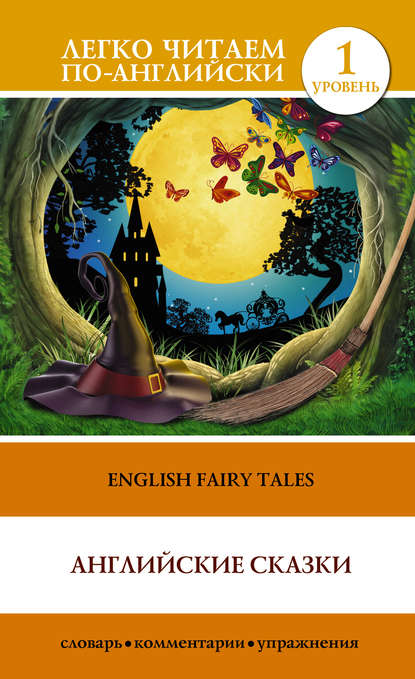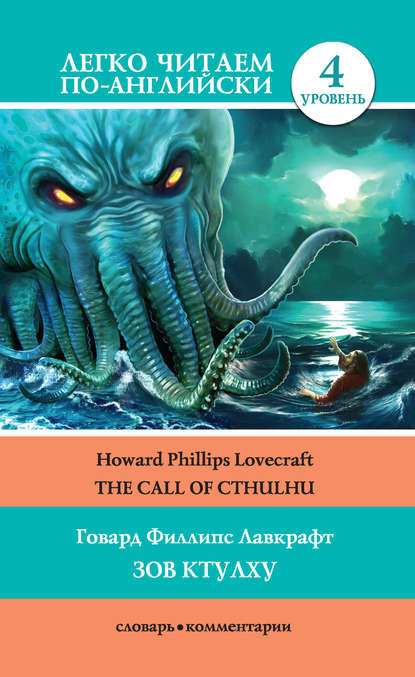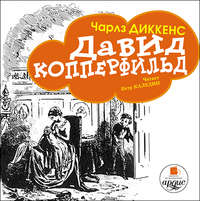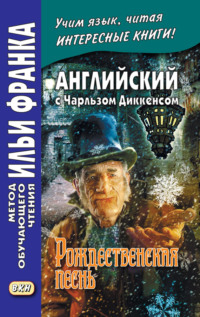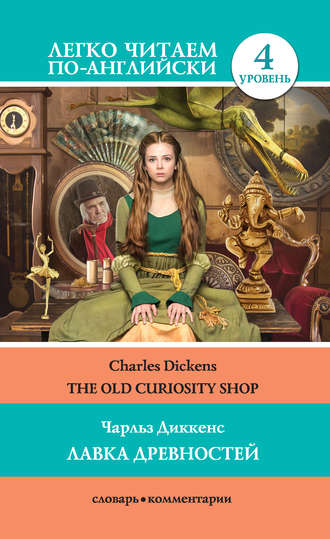
Полная версия
The Old Curiosity Shop / Лавка древностей
“Well,” said Mr. Quilp, “if you will go, you will, Nelly. Here’s the note. It’s only to say that I shall see him tomorrow, or maybe next day. Good-bye, Nelly. Here, you sir; take care of her, do you hear?”
Kit made no reply, and turned about and followed his young mistress.
7
Nelly feebly described the sadness and sorrow of her thoughts. The pressure of some hidden grief burdened her grandfather.
One night, the third after Nelly’s interview with Mrs. Quilp, the old man said he would not leave home.
“Two days,” he said, “two whole, clear, days have passed, and there is no reply. What did he tell thee, Nell?”
“Exactly what I told you, dear grandfather, indeed.”
“True,” said the old man, faintly. “Yes. But tell me again, Nell. What was it that he told you? Nothing more than that he would see me tomorrow or next day? That was in the note.”
“Nothing more,” said the child. “Shall I go to him again tomorrow, dear grandfather? Very early? I will be there and back, before breakfast.”
The old man shook his head, and sighing mournfully, drew her towards him.
“It would be of no use, my dear.”
The old man covered his face with his hands, and hid it in the pillow of the couch on which he lay.
8
Mr. Daniel Quilp entered unseen when the child first placed herself at the old man’s side, and stood looking on with his accustomed grin. He soon cast his eyes upon a chair, into which he skipped. Here, then, he sat, one leg cocked carelessly over the other, his head turned a little on one side, and his ugly features twisted into a complacent grimace.
At length, the old man pronounced his name, and inquired how he came there.
“Through the door,” said Quilp pointing over his shoulder with his thumb. “I’m not quite small enough to get through key-holes. I wish I was. I want to have some talk with you, particularly, and in private. With nobody present, neighbour. Good-bye, little Nelly.”
Nell looked at the old man, who nodded to her to retire, and kissed her cheek.
“Ah!” said the dwarf, smacking his lips, “what a nice kiss! What a capital kiss!”
Nell went away.
“Tell me,” said the old man, “have you brought me any money?”
“No!” returned Quilp.
“Then,” said the old man, clenching his hands desperately, and looking upward, “the child and I are lost!”
“Neighbour,” said Quilp, “let me be plain with you. You have no secret from me now.”
The old man looked up, trembling.
“You are surprised,” said Quilp. “Well, perhaps that’s natural. You have no secret from me now, I say; no, not one. For now, I know, that all those sums of money, that all those loans, advances, and supplies that you have had from me, have gone… shall I say the word?”
“Yes!” replied the old man, “say it, if you will.”
“To the gaming-table,” rejoined Quilp, “This was your precious plan to become rich; this was the secret certain source of wealth in which I spent my money; this was your inexhaustible mine of gold, your El Dorado[26], eh?”
“Yes,” cried the old man, “it was. It is. It will be, till I die.”
“I have been blinded,” said Quilp looking contemptuously at him, “by a mere shallow gambler!”
“I am no gambler,” cried the old man fiercely. “I never played for gain of mine, or love of play. Every piece I staked, I whispered to myself that orphan’s name and called on Heaven to bless the venture; which it never did. Who were those with whom I played? Men who lived by plunder, profligacy, and riot.”
“When did you first begin this mad career?” asked Quilp.
“When did I first begin?” he rejoined, passing his hand across his brow. “When was it, that I first began? When I began to think how little I had saved, how long a time it took to save at all.”
“You lost your money, first, and then came to me. While I thought you were making your fortune (as you said you were) you were making yourself a beggar, eh? Dear me!” said Quilp. “But did you never win?”
“Never!” groaned the old man. “Never won back my loss.”
“I thought,” sneered the dwarf, “that if a man played long enough he was sure to win.”
“And so he is,” cried the old man, “so he is; I have always known it. Quilp, I have dreamed, three nights, of winning the same large sum, I never could dream that dream before, though I have often tried. Do not desert me, now I have this chance. I have no resource but you, give me some help, let me try this one last hope.”
The dwarf shrugged his shoulders and shook his head.
“See Quilp, good tender-hearted Quilp,” said the old man, drawing some papers from his pocket with a trembling hand, and clasping the dwarfs arm, “only see here. Look at these figures, the result of long calculation, and painful and hard experience. I must win. I only want a little help once more, a few pounds, dear Quilp.”
“The last advance was seventy,” said the dwarf; “and it went in one night.”
“I know it did,” answered the old man, “but that was the worst night of all. Quilp, consider, consider that orphan child! Help me for her sake, I implore you; not for mine; for hers!”
“I’m sorry I couldn’t do it really,” said Quilp with unusual politeness. “I’d have advanced you, even now, what you want, on your simple note of hand, if I hadn’t unexpectedly known your secret way of life.”
“Who told you?” retorted the old man desperately, “Come. Let me know the name the person.”
The crafty dwarf said, “Now, who do you think?”
“It was Kit, it is the boy; he is the spy!” said the old man.
“Yes, you’re right” said the dwarf. “Yes, it was Kit. Poor Kit!”
So saying, he nodded in a friendly manner, and left, grinning with extraordinary delight.
“Poor Kit!” muttered Quilp. “I think it was Kit who said I was an uglier dwarf than could be seen anywhere for a penny, wasn’t it? Ha ha ha! Poor Kit!”
9
Kit lifted the latch of the door and passed in.
“Bless us!” cried a woman turning sharply round, “Who’s that? Oh! It’s you, Kit!”
“Yes, mother, it’s me.”
“Why, how tired you look, my dear!”
“Old master did not go out tonight,” said Kit. With which words, he sat down by the fire and looked very mournful and discontented.
Kit’s room was an extremely poor and homely place. His mother was still hard at work at an ironing-table; a young child lay sleeping in a cradle near the fire; and another, a sturdy boy of two or three years old, was sitting bolt upright in a clothes-basket.
“Ah mother!” said Kit, falling upon[27] a great piece of bread and meat, “what a kind woman you are!”
“I hope there are many better, Kit,” said Mrs. Nubbles[28]; “Did you tell me, just now, that your master hadn’t gone out tonight?”
“Yes,” said Kit, “worse luck!”
“I wonder what Mrs. Nelly’d say, if she knew that every night, when she is sitting alone at the window, you are watching in the open street.”
“Never mind what she’d say,” replied Kit; “she’ll never know it, and consequently, she’ll never say anything.”
Mrs. Nubbles ironed away in silence for a minute or two, then she observed:
“I know what some people would say, Kit. Some people would say that you’d fallen in love with her.”
“It’s somebody crossing over here,” said Kit, “and coming very fast too, mother!”
The boy stood. The footsteps drew nearer, the door was opened with a hasty hand, and the child herself, pale and breathless, hurried into the room.
“Miss Nelly! What is the matter?” cried mother and son together.
“I must not stay a moment,” she returned, “grandfather is very ill. I found him upon the floor.”
“I’ll run for a doctor” said Kit, seizing his brimless hat. “I’ll be there directly.”
“No, no,” cried Nell, “there is one there, you… you must never come near us any more!”
“What?” roared Kit.
“Never again,” said the child. “Don’t ask me why, for I don’t know. Pray don’t ask me why, pray don’t be sorry! I have nothing to do with it indeed!”
Kit looked at her with his eyes opened wide.
“Grandfather complains and raves of you,” said the child, “I don’t know what you have done, but I hope it’s nothing very bad. He cries that you’re the cause of all his misery. You must not return to us any more. I came to tell you. Oh, Kit, what have you done? You, in whom I trusted so much! You were almost the only friend I had!”
The unfortunate Kit looked at his young mistress, but was perfectly motionless and silent.
“I have brought his money for the week,” said the child, looking to the woman and laying it on the table “and a little more, for he was always good and kind to me. It grieves me very much to part with him like this, but there is no help[29]. Good-night!”
The child hastened to the door, and disappeared as rapidly as she had come. Kit remained in a state of utter stupefaction[30].
10
The old man was in a raging fever accompanied with delirium. The child was more alone than she had ever been before. The house was no longer theirs. Mr. Quilp took formal possession of the premises and all upon them. The dwarf proceeded to establish himself and his coadjutor in the house.
First, he put an effectual stop to any further business by shutting up the shop. His coadjutor, Mr. Brass[31], was an attorney of no very good repute. He was a tall, meagre man, with a nose like a wen, a protruding forehead, retreating eyes, and hair of a deep red. He wore a long black surtout[32] reaching nearly to his ankles, short black trousers, high shoes, and bluish-grey stockings[33]. He had a cringing manner, but a very harsh voice.
Quilp looked at his legal adviser[34], and was quite overjoyed and rubbed his hands with glee.
“Is it good, Brass, is it nice, is it fragrant?” said Quilp. He smoked a lot. “This is the way to keep off fever, this is the way to keep off every calamity of life!”
“Shall we stop here long, Mr. Quilp?” inquired his legal friend.
“We must stop, I suppose, till the old gentleman upstairs is dead,” returned Quilp.
“He he he!” laughed Mr. Brass, “Oh! Very good!”
“Smoke!” cried Quilp. “Never stop! you can talk as you smoke. Don’t lose time.”
“He he he!” cried Brass faintly. “But if he should get better, Mr. Quilp?”
“Then we shall stop till he does, and no longer,” returned the dwarf.
The sentinel at the door interposed in this place, and without taking his pipe from his lips, growled:
“Here’s the girl coming down.”
“Aha! Nelly! Oh!” said Quilp, “My dear young friend! How is he now, my lady?”
“He’s very bad,” replied the weeping child.
“What a pretty little Nell!” cried Quilp.
“Oh beautiful, sir, beautiful indeed,” said Brass. “Quite charming!”
“Has Nell come to sit upon Quilp’s knee,” said the dwarf, “or is she going to bed in her own little room inside here? What is poor Nelly going to do?”
“What a remarkable pleasant way he has with children!” muttered Brass.
“I’m not going to stay at all,” faltered Nell. “I want a few things out of that room, and then I won’t come down here any more.”
“You’re sure you’re not going to use that little room anymore; you’re sure you’re not coming back, Nelly?’
“No,” replied the child, hurrying away, with the few articles of dress “never again! Never again.”
“She’s very sensitive,” said Quilp, looking after her. “Very sensitive; that’s a pity. The bed is just my size. I think I shall make it my little room.”
The dwarf threw himself on his back upon the child’s bed with his pipe in his mouth. Mr. Brass applauded this picture very much.
11
At length, the crisis of the old man’s disorder was past, and he began to recover. By very slow and feeble degrees his consciousness came back; but the mind was weakened and its functions were impaired. He sat, for hours, together with Nell’s small hand in his, playing with the fingers.
He was sitting in his easy-chair one day, and Nell upon a stool beside him, when a man outside knocked.
“Yes,” the old man said without emotion, “it is Quilp. Quilp is master there. Come in, of course.”
And so he did.
“I’m glad to see you well again at last, neighbour,” said the dwarf, sitting down opposite to him. “You’re quite strong now?”
“Yes,” said the old man feebly, “yes.”
“I don’t want to hurry you, you know, neighbour,” said the dwarf, raising his voice; “but, as soon as you can find a place to live, the better.”
“Surely,” said the old man. “The better for everybody. I will, certainly, we shall not stay here.”
“You see,” pursued Quilp after a short pause, “I have sold the things. Today’s Tuesday. When will the things be moved? This afternoon?”
“What about Friday morning?” returned the old man.
“Very good,” said the dwarf. “So be it, neighbour.”
“Good,” returned the old man. “I shall remember it.”
12
Thursday arrived. In a small dull yard below his window, there was a tree green and flourishing enough, it threw a rippling shadow on the white wall. The old man sat watching the shadows, until the sun went down; and when it was night, and the moon was slowly rising, he still sat in the same spot.
He besought Nelly to forgive him.
“Forgive you what?” said Nell. “Oh grandfather, what should I forgive?”
“All that is past, all that has come upon you, Nell, all that was done,” returned the old man.
“Do not talk so,” said the child. “Pray do not. Let us speak of something else.”
“Yes, yes, we will,” he rejoined. “Hush! We will not stay here. We will go far away from here.”
“Yes, let us go,” said the child earnestly. “Let us leave this place, and never turn back or think of it again. Let us wander barefoot through the world, rather than linger here.”
“We will,” answered the old man, “we will travel afoot through the fields and woods, and by the side of rivers, and trust ourselves to God in the places where He dwells. You and I together, Nell.”
“We will be happy,” cried the child. “We never can be here.”
“No,” rejoined the old man. “Let us steal away tomorrow morning early and softly, that we may not be seen or heard. Poor Nell! Your cheek is pale, and your eyes are weeping; but you will be well again, and merry too, when we are far away. Tomorrow morning, dear, we’ll turn our faces from this scene of sorrow, and be as free and happy as the birds.”
And then, the old man clasped his hands above her head, and said that from that time forth they would wander up and down together.
The child’s heart beat high with hope and confidence. She had no thought of hunger, or cold, or thirst, or suffering. The old man had slept, for some hours, in his bed, and she was busily engaged in preparing for their flight. There were a few articles of clothing for herself to carry, and a few for him; old garments; and a staff to support his feeble steps. But this was not all her task; for now she must visit the old rooms for the last time.
She sat down at the window where she had spent so many evenings. There were some trifles in her room that she would like to take away; but that was impossible.
The old man woke up. He wanted to leave the house immediately, and was soon ready. The child then took him by the hand, and they trod lightly and cautiously down the stairs. At last, they reached the passage on the ground-floor, where the snoring of Mr. Quilp and his legal friend sounded more terrible in their ears than the roars of lions.
They opened the door without noise, and passing into the street, stood still.
“Which way?” said the child.
The old man looked, irresolutely and helplessly, first at her, then to the right and left, then at her again, and shook his head. The child put her hand in his, and led him gently away.
Forth from the city went the two poor adventurers, wandering they knew not whither.
13
Dick Swiveller entered the shop and saw Daniel Quilp.
“You came for some purpose, I suppose,” said Quilp. “What is it you want?”
“I want to know how the old gentleman is,” rejoined Mr. Swiveller, “and to see Nell. I’m a friend of the family, sir, at least I’m the friend of one of the family, and that’s the same thing.”
“You’d better walk in then,” said the dwarf. “Go on, sir, go on.”
“You seem to make yourself at home here,” said Dick, who was unacquainted with Mr. Quilp’s authority.
“I am at home, young gentleman,” returned the dwarf.
Dick was pondering what these words might mean, and still more what the presence of Mr. Brass might mean, when Mrs. Quilp came downstairs, declaring that the rooms above were empty.
“Empty, you fool!” said the dwarf.
“I have been into every room, Quilp,” answered his trembling wife, “and there’s not a soul in any of them.”
Quilp turned to Mr. Brass.
“Indeed,” he said, “we knew that they’d go away today, but not that they’d go so early, or so quietly. But they have their reasons, they have their reasons.”
“Where did they go?” said the wondering Dick.
Swiveller was utterly aghast. The old man and all the money melted away.
“Well,” said Dick, “I suppose it’s of no use, my staying here.”
“Not the least in the world,” rejoined the dwarf.
By this time, certain vans had arrived for the conveyance of the goods. The dwarf observed, that a boy was prying in at the outer door. It was Kit, and Mr. Quilp hailed him by his name.
“Come here, you sir,” said the dwarf. “Well, so your old master and young mistress have gone?”
“Where?” rejoined Kit, looking round.
“Do you mean to say you don’t know where?” answered Quilp sharply. “Where have they gone, eh?”
“I don’t know,” said Kit.
“Oh!” said the dwarf after a little consideration. “Then, I think they’ll come to you.”
“Do you think they will?” cried Kit eagerly.
“Why not?” returned the dwarf. “And when they do, let me know; do you hear? Let me know, and I’ll give you something. I want to do them a kindness, and I can’t do them a kindness unless I know where they are. You hear what I say?”
14
The child trembled with a mingled sensation of hope and fear. The town was glad with morning light; the flowers that sleep by night, opened their gentle eyes and turned them to the day. The two pilgrims, often pressing each other’s hands, or exchanging a smile or cheerful look, pursued their way in silence. They came upon a straggling neighbourhood. At length the streets becoming more straggling yet, dwindled and dwindled away, until there were only small garden patches bordering the road. Then came some houses, one by one, of goodly size with lawns, some even with a lodge where dwelt a porter and his wife. Then came a turnpike; then fields again with trees and hay-stacks; then, a hill. In a pleasant field, the old man and his little guide sat down to rest. Here they made their frugal breakfast.
“Dear grandfather,” said Nelly, “this place is very pretty, and I feel as if laid down on this grass all the cares and troubles we brought with us; never to take them up again.”
“No never to return, never to return” replied the old man, waving his hand towards the city. “You and I are free of it now, Nell.”
“Are you tired?” said the child, “are you sure you don’t feel ill from this long walk?”
“I shall never feel ill again, now that we are once away,” was his reply. “Let us go, Nell. We must be further away; a long, long way further. We are too near to stop[35], and be at rest. Come!”
There was a pool of clear water in the field, in which the child laved her hands and face, and cooled her feet. She refreshed the old man too, cast the water on him with her hands, and dried it with her simple dress.
“I can do nothing for myself, my darling,” said the grandfather; “I don’t know how it is, I could once, but the time’s gone. Don’t leave me, Nell; say that you’ll not leave me. I love you, indeed I do. If I lose you, my dear, I must die!”
He laid his head upon her shoulder and moaned piteously. She soothed him with gentle and tender words. He was soon calmed and fell asleep, singing to himself in a low voice, like a little child.
He awoke refreshed, and they continued their journey. The road was pleasant, lying between beautiful pastures and fields of corn. They were now in the open country; the houses were very few and scattered at long intervals, often miles apart.
15
The sun was setting when they reached the wicket-gate[36] at which the path began. The church was old and grey, with ivy clinging to the walls, and round the porch. The old man and the child passed behind the church, and they heard voices near.
Two men were seated upon the grass. It was not difficult to divine that they were showmen exhibitors[37] of the freaks of Punch[38]. Upon a tombstone behind them, was a figure of that hero himself.
The men raised their eyes when the old man and his young companion were close upon them, and pausing in their work, returned their looks of curiosity. One of them was a little merry-faced man with a twinkling eye and a red nose. The other that was he who took the money had rather a careful and cautious look.
The merry man was the first to greet the strangers with a nod. He observed that perhaps that was the first time the old man had ever seen a Punch off the stage[39].
“Why did you come here?” said the old man, sitting down beside them, and looking at the figures with extreme delight.
“You see,” rejoined the little man, “we need to repair our puppets.”
“Good!” said the old man, touching one of the puppets, and drawing away his hand with a shrill laugh. “Are you going to show them tonight? Are you?”
“That is the intention, sir,” replied the other, “and Tommy Codlin[40] is calculating at this minute how much we’re going to get tonight.”
The little man accompanied these latter words with a wink.
To this Mr. Codlin, who had a surly, grumbling manner, replied: “Look here; here’s all this Judy’s[41] clothes falling to pieces again. You haven’t got a needle and thread I suppose?”
The little man shook his head. Seeing that they were at a loss, the child said timidly: “I have a needle, sir, in my basket, and thread too. Will you let me try to mend it for you? I think I could do it neater than you could.”
Mr. Codlin had nothing to urge against this proposal. Nelly, kneeling down beside the box, was soon busily engaged in her task. The merry little man looked at her with an interest. When she had finished her work he thanked her, and inquired where they were travelling.
“No further tonight, I think,” said the child, looking towards her grandfather.
“If you’re looking for a place to stop at,” the man remarked, “I can advise you to take up[42] at the same house with us. That’s it. The long, low, white house there. It’s very cheap.”
They all rose and walked away together. The old man was keeping close to the box of puppets in which he was quite absorbed.
The public-house was kept by a fat old landlord and landlady who made no objection to receiving their new guests, but praised Nelly’s beauty. The landlady was very much astonished to learn that they had come all the way from London.
“These two gentlemen have ordered supper in an hour’s time,” she said, taking her into the bar; “and your best plan will be to sup with them.”
The Punch and Judy performance was applauded to the echo, and voluntary contributions showed the general delight. Among the laughter none was more loud and frequent than the old man’s. Nell’s was unheard, for she, poor child, with her head drooping on his shoulder, had fallen asleep.
The supper was very good, but she was too tired to eat, and yet did not want to leave the old man until she had kissed him in his bed. It was but a loft partitioned into two compartments, where they were to rest, but they were well pleased with their lodging and had hoped for none so good[43]. The old man was uneasy when he had lain down, and begged that Nell would come and sit at his bedside as she had done for so many nights. She hastened to him, and sat there till he slept.




